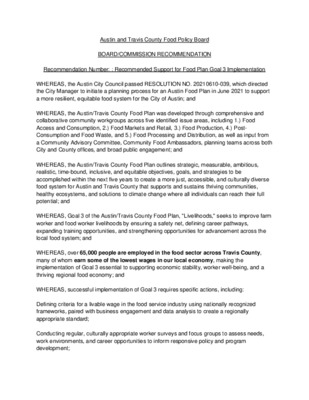Item 7. Food Plan Goal 3 Recommendation — original pdf
Backup

Austin and Travis County Food Policy Board BOARD/COMMISSION RECOMMENDATION Recommendation Number: : Recommended Support for Food Plan Goal 3 Implementation WHEREAS, the Austin City Council passed RESOLUTION NO. 20210610-039, which directed the City Manager to initiate a planning process for an Austin Food Plan in June 2021 to support a more resilient, equitable food system for the City of Austin; and WHEREAS, the Austin/Travis County Food Plan was developed through comprehensive and collaborative community workgroups across five identified issue areas, including 1.) Food Access and Consumption, 2.) Food Markets and Retail, 3.) Food Production, 4.) Post- Consumption and Food Waste, and 5.) Food Processing and Distribution, as well as input from a Community Advisory Committee, Community Food Ambassadors, planning teams across both City and County offices, and broad public engagement; and WHEREAS, the Austin/Travis County Food Plan outlines strategic, measurable, ambitious, realistic, time-bound, inclusive, and equitable objectives, goals, and strategies to be accomplished within the next five years to create a more just, accessible, and culturally diverse food system for Austin and Travis County that supports and sustains thriving communities, healthy ecosystems, and solutions to climate change where all individuals can reach their full potential; and WHEREAS, Goal 3 of the Austin/Travis County Food Plan, "Livelihoods," seeks to improve farm worker and food worker livelihoods by ensuring a safety net, defining career pathways, expanding training opportunities, and strengthening opportunities for advancement across the local food system; and WHEREAS, over 65,000 people are employed in the food sector across Travis County, many of whom earn some of the lowest wages in our local economy, making the implementation of Goal 3 essential to supporting economic stability, worker well-being, and a thriving regional food economy; and WHEREAS, successful implementation of Goal 3 requires specific actions, including: Defining criteria for a livable wage in the food service industry using nationally recognized frameworks, paired with business engagement and data analysis to create a regionally appropriate standard; Conducting regular, culturally appropriate worker surveys and focus groups to assess needs, work environments, and career opportunities to inform responsive policy and program development; Establishing a commission or working group under the Austin/Travis County Food Policy Board to address food and farm worker rights, including benefits, unfair labor practices, and workplace safety; Researching and recommending incentives such as tax rebates and wage supplements to support food system employers who provide livable wages and fair labor practices; Expanding workforce training and career advancement programs tailored to food system roles, including culinary skills training and support for worker organizing and leadership development; Recognizing and supporting food businesses that adopt high-road employment practices, including livable wages, career pathways, and worker ownership opportunities, through public campaigns and financial support; and Increasing worker ownership opportunities through education and connections to capital to support the creation of cooperatives and other worker-led food businesses; WHEREAS, Good Work Austin has submitted an Unmet Needs document to the City of Austin that outlines the need, phases of implementation, and impact of Goal 3 strategies; WHEREAS, meaningful implementation of these strategies will require an estimated $292,000 in funding to support staffing, research, business and worker engagement, public education, incentive design, and program delivery, ensuring the success of Goal 3 and long-term improvements for food system workers; NOW, THEREFORE, BE IT RESOLVED that the Austin-Travis County Food Policy Board strongly encourages the Austin City Council and Travis County Commissioners Court to allocate an estimated $292,000 in funding to external agencies, provide staff support, and coordinate resources necessary to implement Goal 3: Livelihoods of the Austin/Travis County Food Plan outlined in the Goal 3 Unmet Needs document submitted to City Council. This includes investment in worker-centered research, policy development, workforce training, and incentive programs (i.e. rebates, tax incentives, grants, etc.) that support living wages, workplace protections, and career advancement for farm and food workers throughout our local food system. BE IT FURTHER RESOLVED, these efforts will directly benefit the over 65,000 food workers in Travis County by making it easier for businesses to begin the path to increasing wages and ensuring fair compensation practices. Regular surveys will identify and address systemic issues, enhancing worker satisfaction, retention and safety, and identification of needed resources for food workers across the local food industry. The Food Worker Rights Commission will empower food workers by addressing gaps in protections like wage theft, unsafe conditions, and wrongful termination while improving workplace equity. It will serve as a bridge between workers, businesses, and policymakers, ensuring sustainable solutions and amplifying worker voices across Travis County. BE IT FURTHER RESOLVED, identifying incentives will guide policies that encourage over 6,000 businesses to adopt livable wage practices through practical, evidence-based solutions. Engaging business owners and analyzing effective models from other cities will strengthen the local food economy and improve worker livelihoods for 65,000 workers. Training opportunities will create career advancement for workers, reducing turnover, filling labor gaps, and boosting the local economy. By supporting worker organizing and strengthening small businesses, this work can create a more just and equitable food system where everyone thrives. By recognizing and supporting high-road businesses, it will contribute to incentivizing locally owned businesses to adopt equitable business practices. Enhanced organizing will empower workers, fostering equitable practices across the food industry. These investments will have long-term impacts on the local food economy, worker satisfaction, and community resilience.